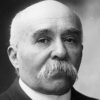This noble spirit saved alive
Has foiled the Devil’s will!
“He who strives on and lives to strive
Can earn redemption still.”[Gerettet ist das edle Glied
Der Geisterwelt vom Bösen,
„Wer immer strebend sich bemüht,
Den können wir erlösen.“]Johann Wolfgang von Goethe (1749-1832) German poet, statesman, scientist
Faust: a Tragedy [eine Tragödie], Part 2, Act 5, sc. 7 “Mountain Gorges,” l. 11934ff [Angels] (1808-1829) [tr. Luke (1994)]
(Source)
(Source (German)). The portion in quotation marks is not actually a quote from anything, but Goethe's thesis being highlighted. Alternate translations:
Freed is the noble scion of
The Spirit-world from evil.
Him can we save that tireless strove
Ever to higher level.
[tr. Latham (1790)]
Rescued is the noble limb
Of the spirit-world from the bad one:
For he who toils and ever strives
Him can we aye deliver.
[tr. Bernays (1839)]
Saved is the spirit kingdom's flower
From evil and the grave.
"Who strives with all his power,
We are allowed to save."
[tr. Kaufmann (1961)]
Pure spirits' peer, from evil coil
He was vouchsafed exemption;
Whoever strives in ceaseless toil,
Him we may grant redemption.
[tr. Arndt (1976)]
He's saved from evil, the great soul,
Confounding clever Satan:
"Who strives, and keeps on striving still,
For him there is redemption!"
[tr. Greenberg (1998); in his 2004 revision, the last line reads "For him there is salvation."]
He’s escaped, this noble member
Of the spirit world, from evil,
Whoever strives, in his endeavour,
We can rescue from the devil.
[tr. Klein (2003)]
Quotations about:
striving
Note not all quotations have been tagged, so Search may find additional quotes on this topic.
I hope that in this year to come, you make mistakes.
Because if you are making mistakes, then you are making new things, trying new things, learning, living, pushing yourself, changing yourself, changing your world. You’re doing things you’ve never done before, and more importantly, you’re Doing Something.
So that’s my wish for you, and all of us, and my wish for myself. Make New Mistakes. Make glorious, amazing mistakes. Make mistakes nobody’s ever made before. Don’t freeze, don’t stop, don’t worry that it isn’t good enough, or it isn’t perfect, whatever it is: art, or love, or work or family or life.
Whatever it is you’re scared of doing, Do it.
Make your mistakes, next year and forever.Neil Gaiman (b. 1960) British author, screenwriter, fabulist
Blog entry (2011-12-31), “My New Year Wish”
(Source)
Who does the best his circumstance allows
Does well, acts nobly; angels could no more.Edward Young (1683-1765) English poet
The Complaint: Or, Night Thoughts, Vol. 1, No. 2 “Night the Second: On Time, Death, and Friendship,” ll. 91-92 (1742-11) (1744)
(Source)
So it is not a matter of whether it is possible to attain Buddhahood, or if it is possible to make a tile a jewel. But just to work, just to live in this world with this understanding is the most important point, and that is our practice. That is true zazen.
Shunryū Suzuki (1905-1971) Japanese Zen Buddhist master
Lecture in Los Altos, California (1 Sep 1967)
(Source)
What one has, one ought to use; and whatever he does he should do with all his might.
[Quod est, eo decet uti: et quicquid agas, agere pro viribus.]
Marcus Tullius Cicero (106-43 BC) Roman orator, statesman, philosopher
De Senectute [Cato Maior; On Old Age], ch. 9 / sec. 27 (9.27) (44 BC) [ed. Hoyt (1882)]
(Source)
On failing strength in old age.
(Source (Latin)). Alternate translations:
A man ought wele for to use in every age of that thyng that nature giveth hym, and also it apperteyneth that thou doo alle thyngs aftir the mesure and aftir the quantyte of thyne owne propre strength and not to usurpe and take the unto gretter thyngs than thou maist not nor hast no power to execute.
[tr. Worcester/Worcester/Scrope (1481)]
For whatsoever is engraffed naturally in man, that is it fit and decent to use; and in all things that he taketh in hand to labour, and to do his diligent endeavour according to his strength.
[tr. Newton (1569)]
For that which is naturally ingraffed in a man, that it becommeth him to use, and to desire to do nothing above his strength.
[tr. Austin (1648)]
Then with that force content, which Nature gave,
Nor am I now displeas'd with what I have.
[tr. Denham (1669)]
What strength and vigour, we have still remaining, ought to be preserv'd, by making the best use of them while we are able.
[tr. Hemming (1716)]
What a Man has, he ought to use; and whatever he does, to do it according to his Power.
[tr. J. D. (1744)]
For it is our business only to make the best use we can of the powers granted us by nature, and whatever we take in hand, to do it with all our might.
[tr. Logan (1750)]
It is sufficient if we exert with spirit, upon every proper occasion, that degree of strength which still remains with us.
[tr. Melmoth (1773)]
What is, that it becomes you to employ; and whatever you do, to do it according to the measure of your powers.
[Cornish Bros. ed. (1847)]
What one has, that one ought to use; and whatever you do, you should do it with all your strength.
[tr. Edmonds (1874)]
It is becoming to make use of what one has, and whatever you do, to do in proportion to your strength.
[tr. Peabody (1884)]
You should use what you have, and whatever you may chance to be doing, do it with all your might.
[tr. Shuckburgh (1900)]
What nature gives to man, that let him use:
Still fit your work according to your strength.
[tr. Allison (1916)]
Such strength as a man has he should use, and whatever he does should be done in proportion to his strength.
[tr. Falconer (1923)]
Use what you have: that is the right way; do what’s to be done in proportion as you have the strength for it.
[tr. Copley (1967)]
Whatever strength you have at any given moment, you should use; and whatever you do, you should do it within the limitations of that strength.
[tr. Cobbold (2012)]
You use what you have and gauge your activities accordingly.
[tr. Gerberding (2014)]
You see, It’s a lot better to proceed
With your own strength and anything you do
According to your strength you should pursue.
[tr. Bozzi (2015)]
man’s life is interesting primarily when he has failed — I well know. For it’s a sign that he tried to surpass himself.
Not failure, but low aim, is crime.
James Russell Lowell (1819-1891) American diplomat, essayist, poet
“For an Autograph,” st. 5 (1868)
(Source)
Aim at perfection in everything, though in most things it is unattainable; however, they who aim at it, and persevere, will come much nearer it than those whose laziness and despondency make them give it up as unattainable.
Lord Chesterfield (1694-1773) English statesman, wit [Philip Dormer Stanhope]
Letter to his son, #226 (24 May 1750)
(Source)









